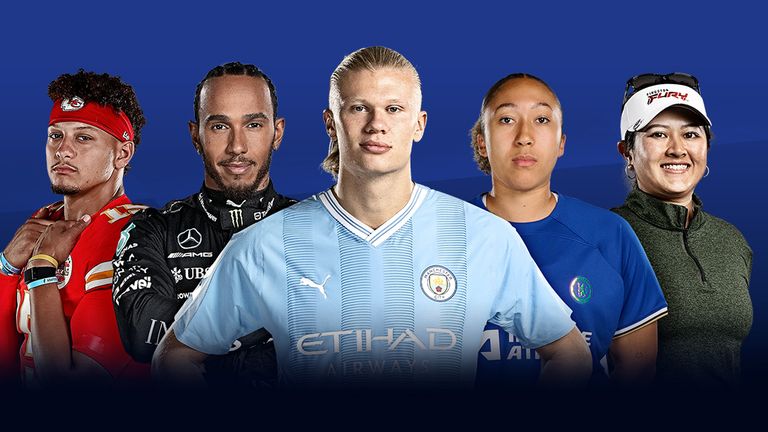'History catches up when we speak out'
Megan Rapinoe joins
The HangOut with Pernille and Magda

Through her words and actions as well as her ability, Megan Rapinoe has combined a career of achievements with inspirational athlete activism; accepting an invitation from Chelsea's Pernille Harder and Magda Eriksson, she chats about her motivations, the conviction behind her message, and the comfort she finds within the LGBTQ+ community
Megan Rapinoe is sharing a "mind trick" she plays on herself when speaking in public, a conscious shuffle that helps to get her on the front foot.
Connected via a laptop nearly 5,000 miles away are Pernille Harder and Magda Eriksson. It's Saturday night in the UK, and London is calling Seattle for a skills school in athlete activism. The Chelsea players - a couple keen to harness their own power to make change - are asking Rapinoe if she ever gets nervous when making a speech.
"Definitely! I'm thinking, 'oh God'..." She grimaces at the thought, but then smiles good-naturedly. This hangout is happening soon after an OL Reign training session - the 14th pre-season of Rapinoe's professional career - and there's a laid-back but lively energy to the conversation.
Yet when the US star has the floor - such as when she accepted the FIFA Best Women's Player Award at Milan's Scala opera house in 2019, and questioned why football wasn't more outraged at the racism, homophobia and sexism that blights it - her unapologetic intention is to make her audience uncomfortable.
"In a big room like that, they probably don't want to hear it," she tells Harder and Eriksson. "But they are expecting it a little bit - and they kind of need to hear it. I feel like I'd be letting myself down if I didn't say those things.
"I don't care that much what those people think. I care about the kid who's 13 and crying themselves to sleep every night.
"It sounds dramatic, but that's really what I think about."
The video callers listen intently as Rapinoe discusses her public speaking technique. "I think about how hard we have to work as women, on and off the field - like you guys do, and other athletes. The mind trick is that I'm part of the group that's fighting for more, so that's who I have to answer to.
"I want to make sure the message is OK with them. For the others who want things to stay the same - that's not my focus."
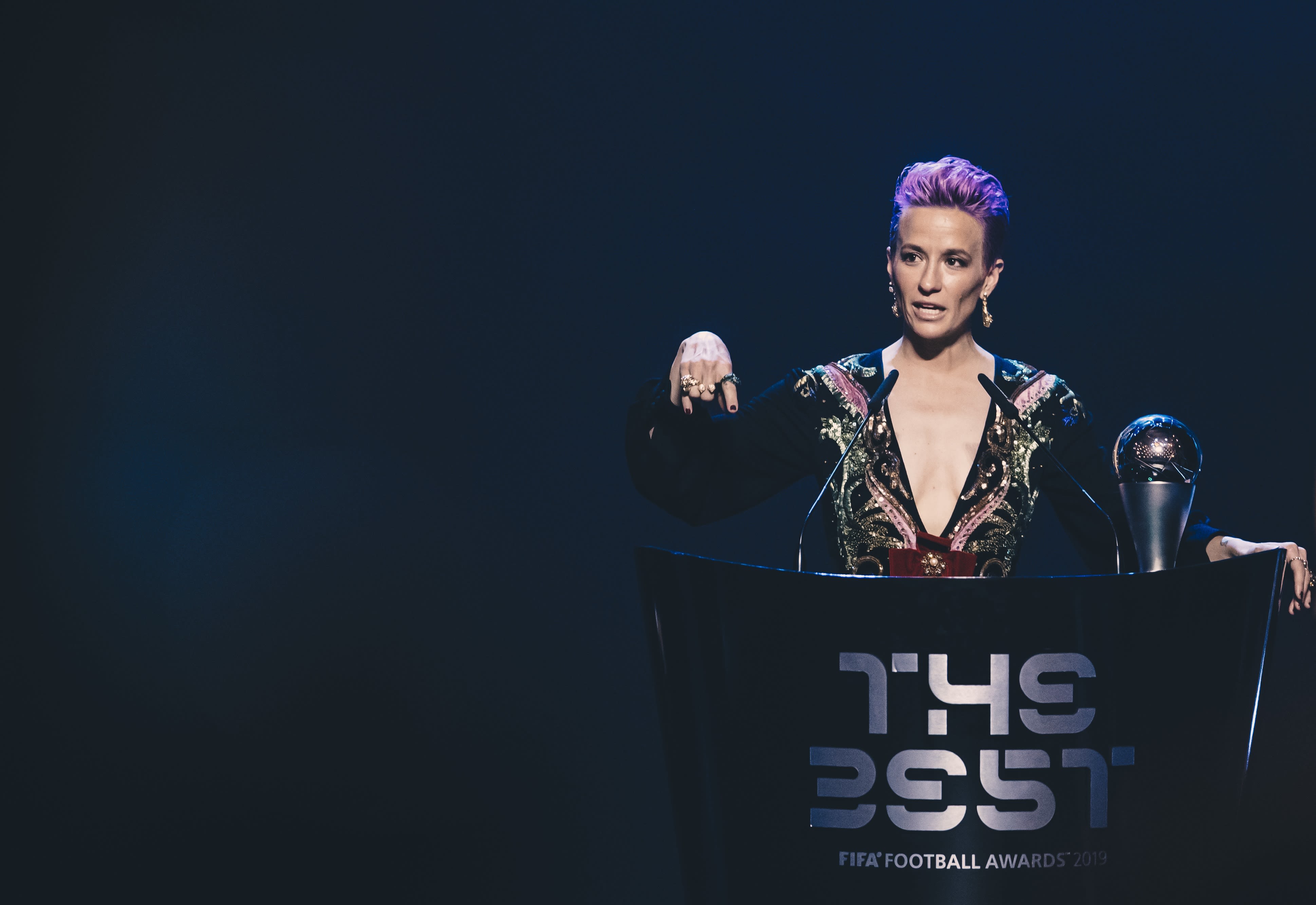
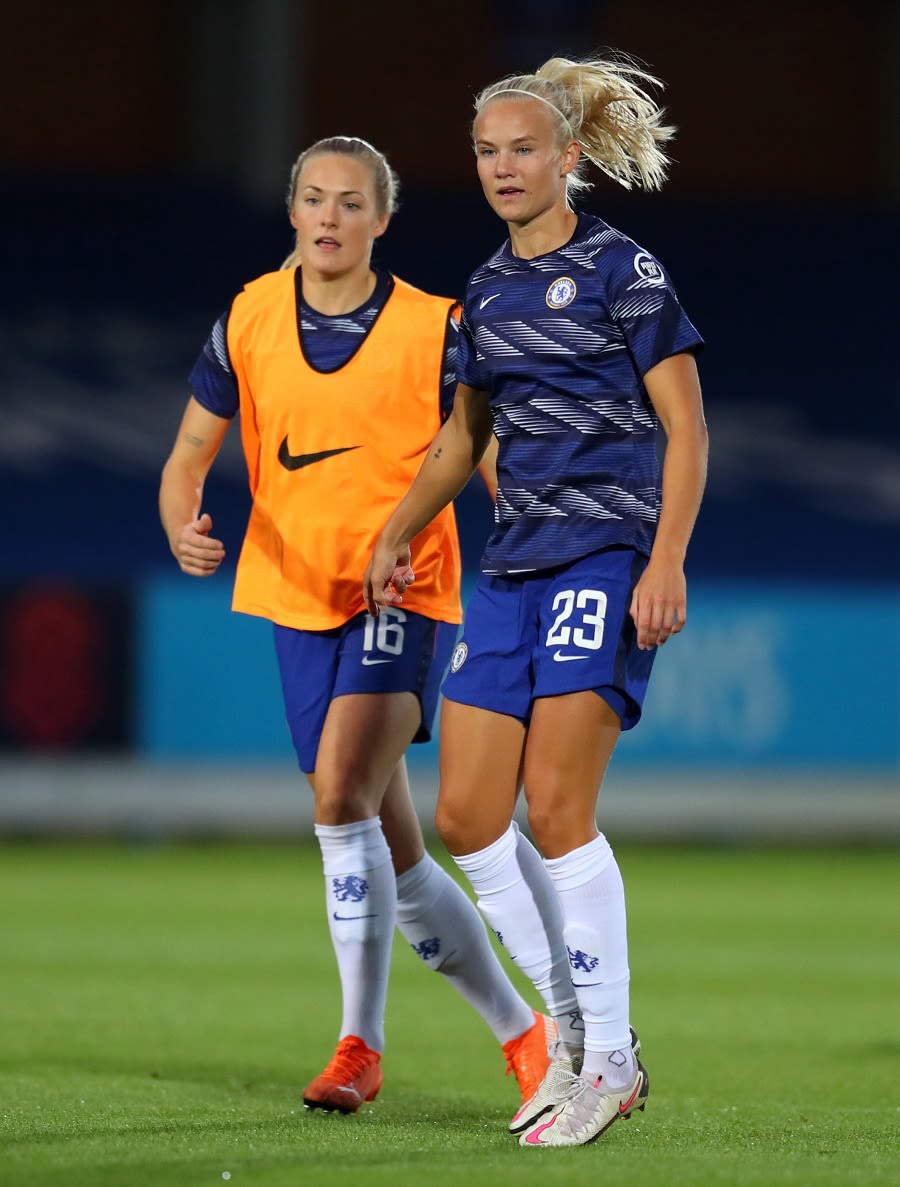
Love and Pride
In February 2021 - during LGBT+ History Month in the UK - messages came through from around the world when Harder and Eriksson opened up their DMs on Twitter for Valentine's Day.
Having fallen in love in 2014 while both playing for Linköpings in Sweden, they were reunited as team-mates when Harder moved to Chelsea in September 2020 for a world-record transfer fee in women's football. It's rare for stars to make themselves so accessible on social media but, as with a Rapinoe speech, this was a way to shake up the status quo.
The experience was "overwhelming", according to Eriksson, and it also served as a spur to action. "There are still so many people out there struggling," she says.
Harder nods in agreement. "It was sad to see all these messages from people stuck in their sexuality. They don't dare to come out, not even to their parents because they are afraid of how they will react.
"Our dream would be to create a society where people shouldn't make it a 'thing' to come out. The question is, how do we create that environment?"
To find out, they are embarking on a series of interviews exploring how sport can help, and whether there is a best path to follow that might speed up meaningful change for LGBTQ+ people, a route that's realistic rather than idealistic.
Rapinoe is their first guest, a long-time leader in her field and a lesbian role model to both Harder and Eriksson.
Seven years their senior, she was already an Olympic gold medallist with the United States and a French league and cup champion by the time the couple, who are from Denmark and Sweden respectively, began dating. A year later, Rapinoe had her first World Cup winners' medal and was also named in the tournament’s Dream Team. 2019 would bring a repeat achievement, plus the Golden Ball and Golden Boot awards.
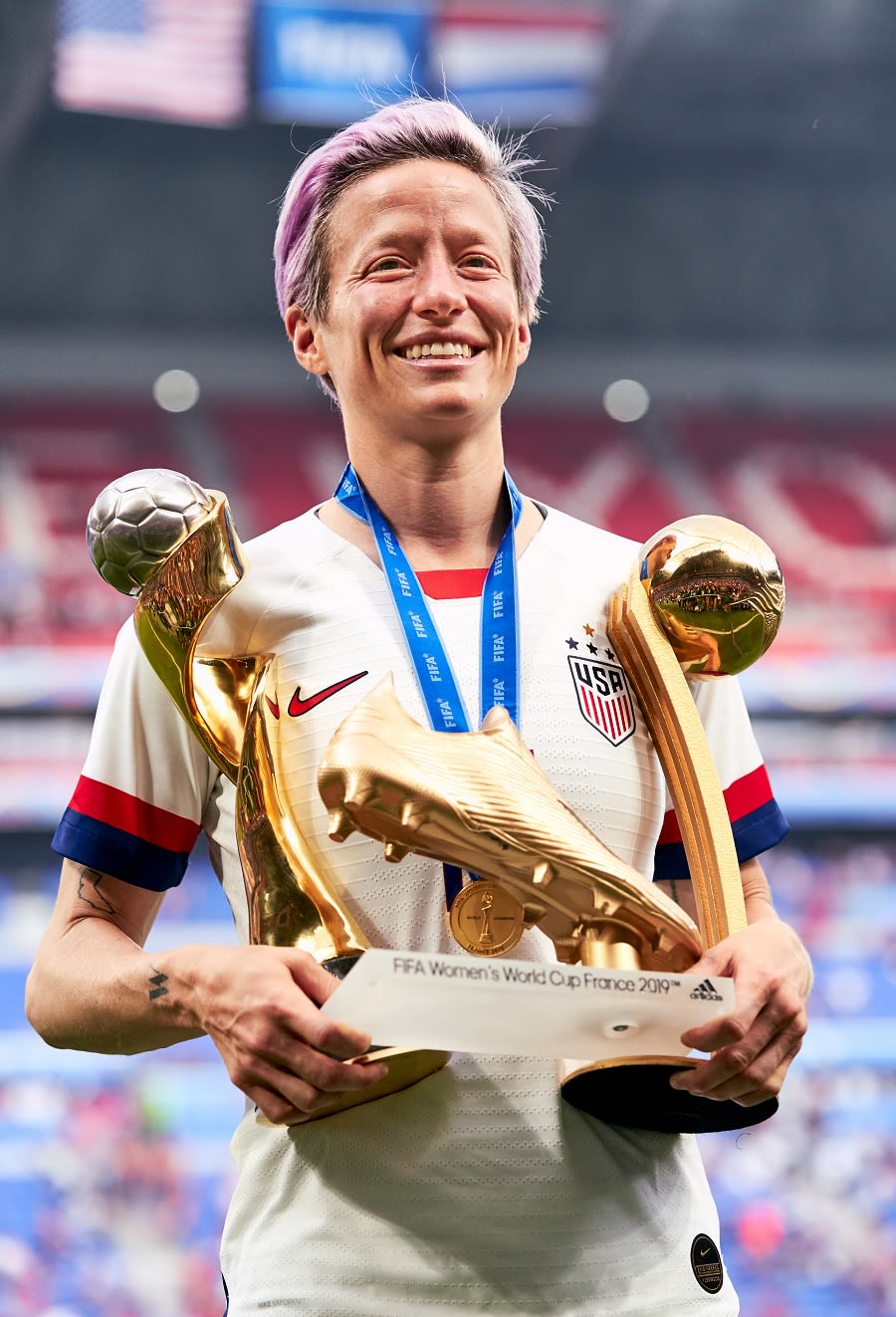
Sweden and the US qualified out of the same World Cup group in France, with the former going on to beat Canada 1-0 in the last 16.
After playing in that match at the Parc des Princes, Eriksson approached the stands where Harder had been cheering her on, a Dane wearing the yellow Sweden shirt in a spirit of Scandinavian unity as well as a way to support her girlfriend.
They celebrated, embraced, and kissed, with the moment captured by a photographer.
Quickly, the image began to travel around the planet via social media.
Describing the moment to Rapinoe, they pretend to squabble about who smooched who; what is in no doubt is that this simple show of affection became a turning point in their lives.
"There was no thought that went into it," says Eriksson. However, within a few hours, Harder checked her phone and realised this picture she didn’t even know existed was now going viral.
The responses she saw were warm, welcoming, and appreciative of the representation.
"I had 20,000 new followers! That made us realise that we have a platform. When we say or do something, people listen."
Rapinoe remembers the photo fondly. "I saw it!" she laughs. "We can't change the world by ourselves - but sometimes you just need that spark."
The snapshot was carried beyond football, challenging perceived conventions about LGBTQ+ women and dismantling stereotypes in sport. "You can look however you want," says Rapinoe, "but a photo like yours does break barriers. It's different to see that.
"And that's not just for people who may not understand but for players as well. There are closeted players, still, who are thinking 'I don't really look like Megan, so I don't know if it's going to be accepted if I come out as gay'."
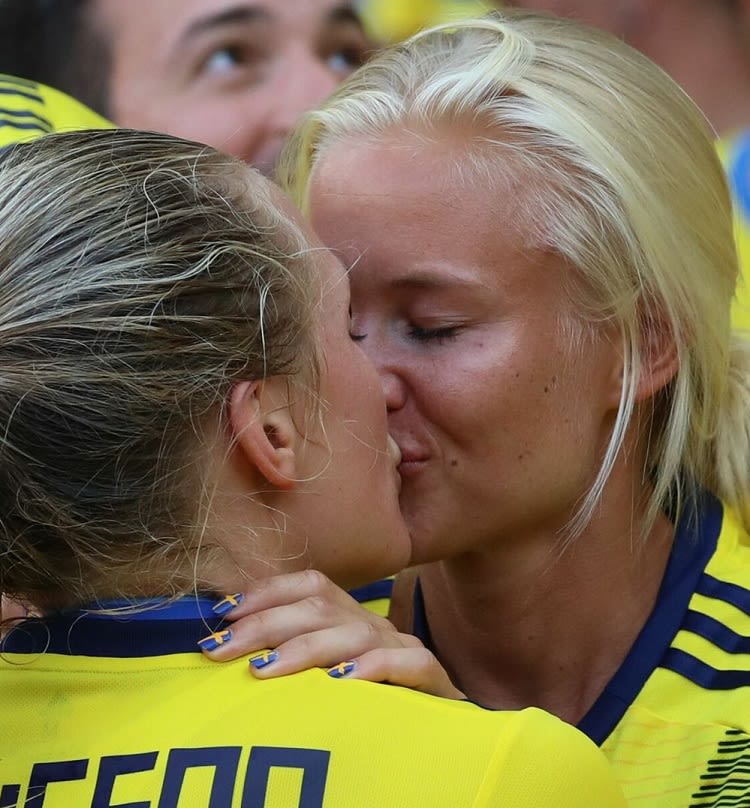
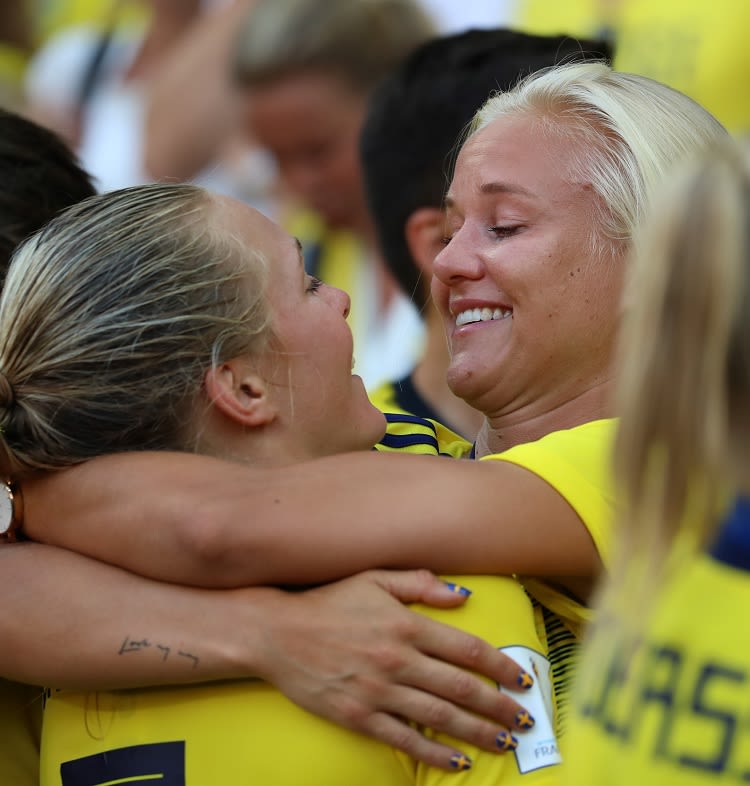
The impact made by the kiss image demonstrates how even an act that happens on instinct can be influential.
Eriksson says it's now the "goal" for her and Harder to use their platforms more to speak out against injustices. They also know that doing so requires next-level confidence, the kind that Rapinoe possesses.
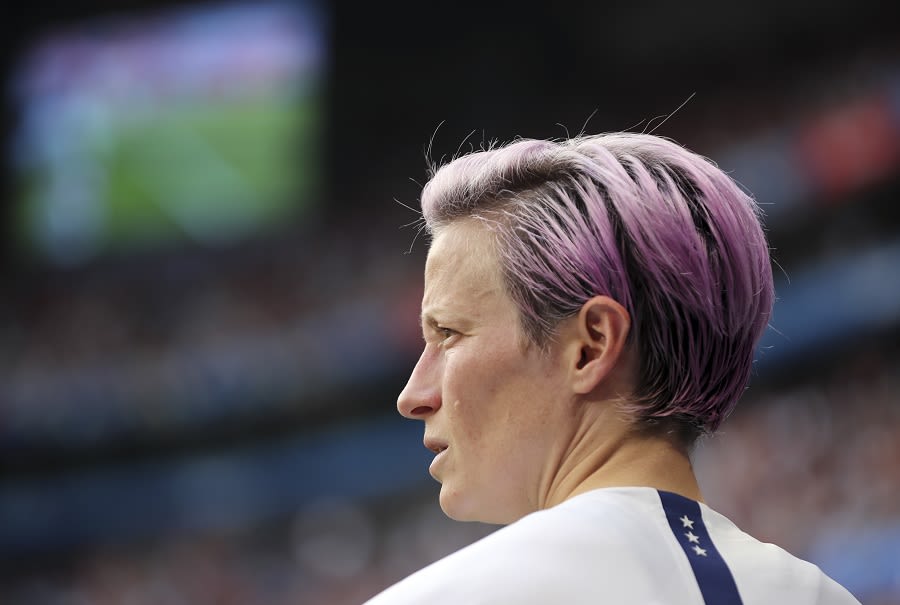
The American feels she built her courage, in part, from seeing how others would later regret not speaking up when they had been given the chance.
"Maybe I'm just kind of wild but I try to always take those opportunities, to show people that it's OK."
On and off the ball, Rapinoe's timing and delivery makes her stand out - as exemplified in her own iconic World Cup image.
A feeling of euphoria
Four days after Eriksson and Harder's kiss, and at the same Parc des Princes venue, Rapinoe struck a triumphant, arms-outstretched pose after opening the scoring with a free-kick in the US team's quarter-final win over hosts France.
The goal celebration had a gladiatorial quality - as if to say, 'are you not entertained?'
Having been executed in women's sport, the protagonist of the pose wearing a wry smile and magenta-coloured hair, it defied expectations and transcended the occasion.
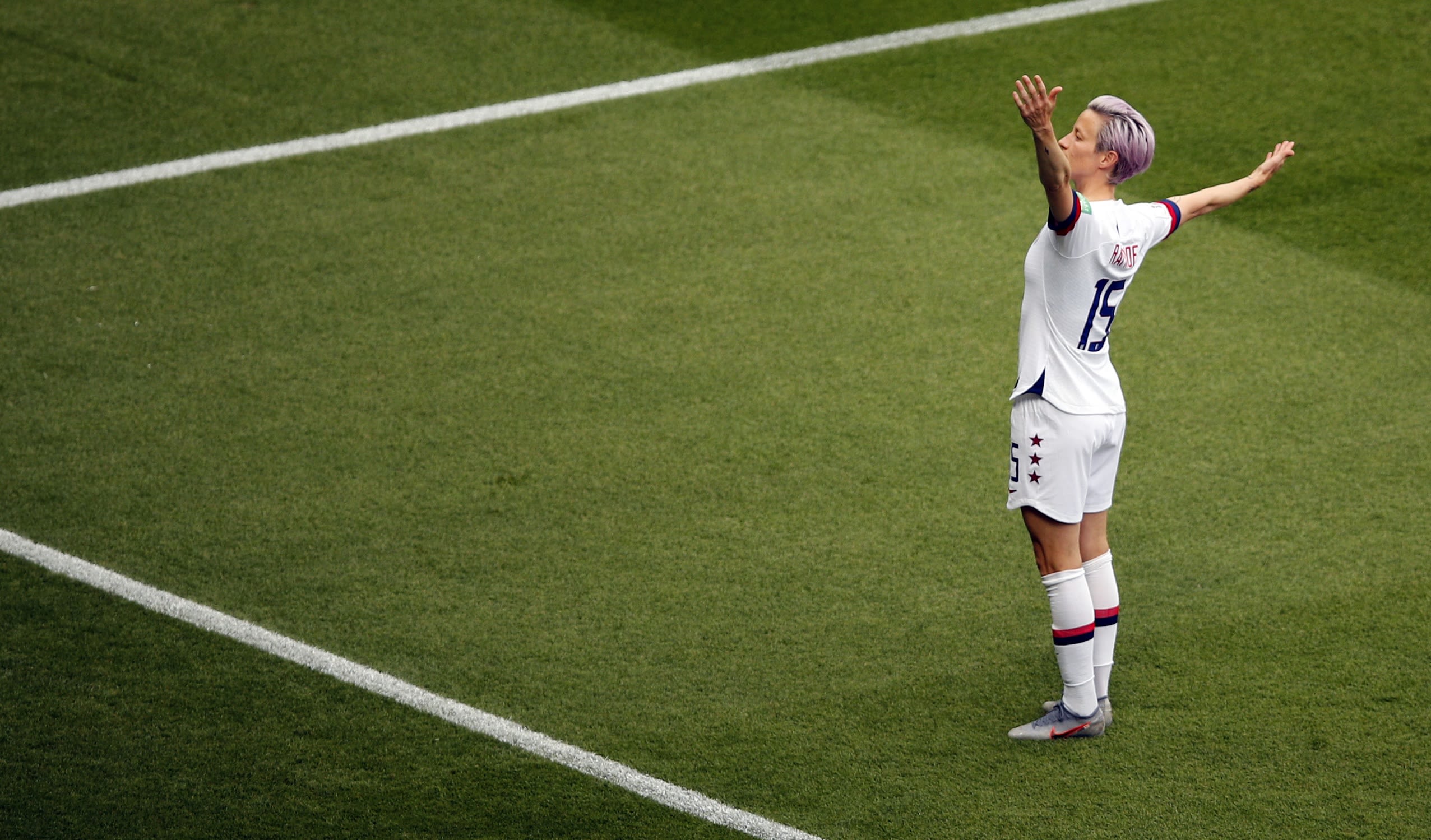
The pose has recently been immortalised in a 15-foot mural at the Black Hart soccer bar in Saint Paul, Minnesota.
What is also recognised as archetypal Rapinoe was one of her post-match quotes in Paris. When asked about the significance of putting in a peak performance during Pride Month in June, she replied: "Go gays! You can't win a championship without gays on your team!"
It was a set-piece quip that hit the sweet spot, a comment that flew over bewildered heads but landed perfectly with her target fanbase.
It certainly resonated with Harder and Eriksson, and Rapinoe - today wearing a neon pink beanie, concealing hair dyed half-green and half-pink - says she relishes putting a fresh spin on how being LGBTQ+ is presented in popular culture. The topic often comes up in discussion with her fiancée Sue Bird, the five-time Olympic gold medallist in basketball.
"A lot of the stories traditionally that you hear about gay people is just how hard it is.
"I don't want to take away from people who really struggle because that is a huge part of it. There's a lot of homophobia and violence for gay people and trans people, and it can be very scary. But there's also joy in it as well.
"Sue and I are at the point in our lives where we love being gay. It's something that we celebrate. To show everyone a different kind of gay story because so many are traditionally rooted in the struggle - you're seeing more of that now."
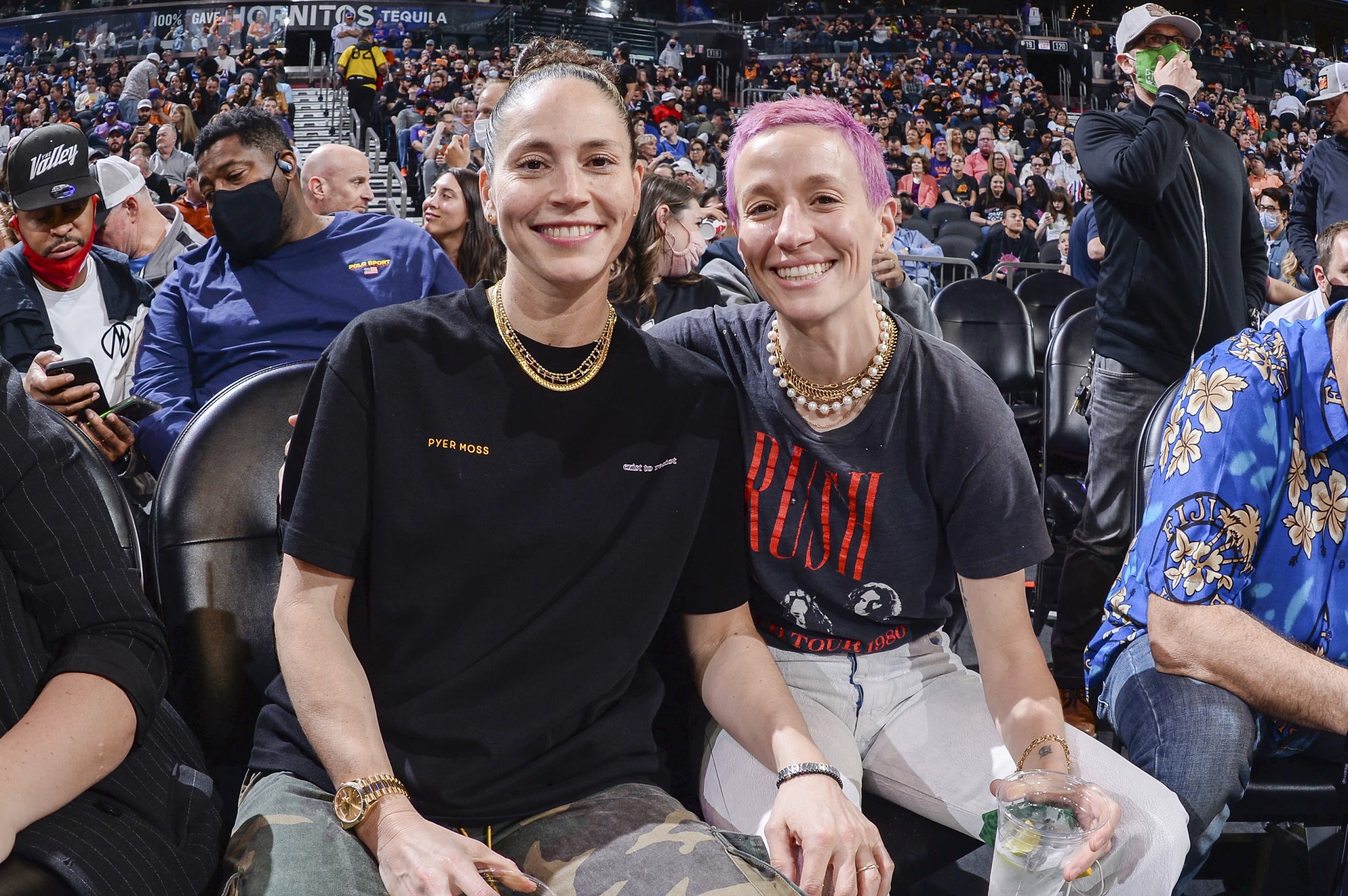
Sue Bird and Megan Rapinoe attending a Phoenix Suns game in November 2021 (Photo by Andrew D. Bernstein/NBAE via Getty Images)
Sue Bird and Megan Rapinoe attending a Phoenix Suns game in November 2021 (Photo by Andrew D. Bernstein/NBAE via Getty Images)
It's why she feels such a strong connection with Harder and Eriksson. "Your photo at the World Cup wasn't staged or planned. Your partner's at the World Cup supporting you, of course you're going to kiss them! It would be weird not to. You're showing a very joyous, normal, happy, healthy relationship.
"So much of the negative rhetoric that we hear is that you’re not going to be happy, and that it's 'unnatural' or whatever. Being able to provide those joyous, happy stories as well is really important to break down stereotypes and get a different narrative in there."
Unafraid, unapologetic
Rapinoe tells her own story in full in her 2020 autobiography 'One Life'. In the book's introduction, she describes the backlash and online hate that ensued when she took a knee during the national anthem before an NWSL match in Chicago in September 2016, just a week after Colin Kaepernick had first made the gesture in a San Francisco 49ers' preseason game.
She had been moved by Kaepernick's concise explanation for his protest against police brutality and social injustice, which came two months before the presidential election. Fears were heightening in a tense political climate. "I am not going to stand up to show pride in a flag for a country that oppresses black people and people of colour," Kaepernick told NFL Media. "To me, this is bigger than football."
Rapinoe agreed and considered his comments to be an invitation. She knelt in solidarity, only for America's disunity to be displayed to her in all its ugliness.
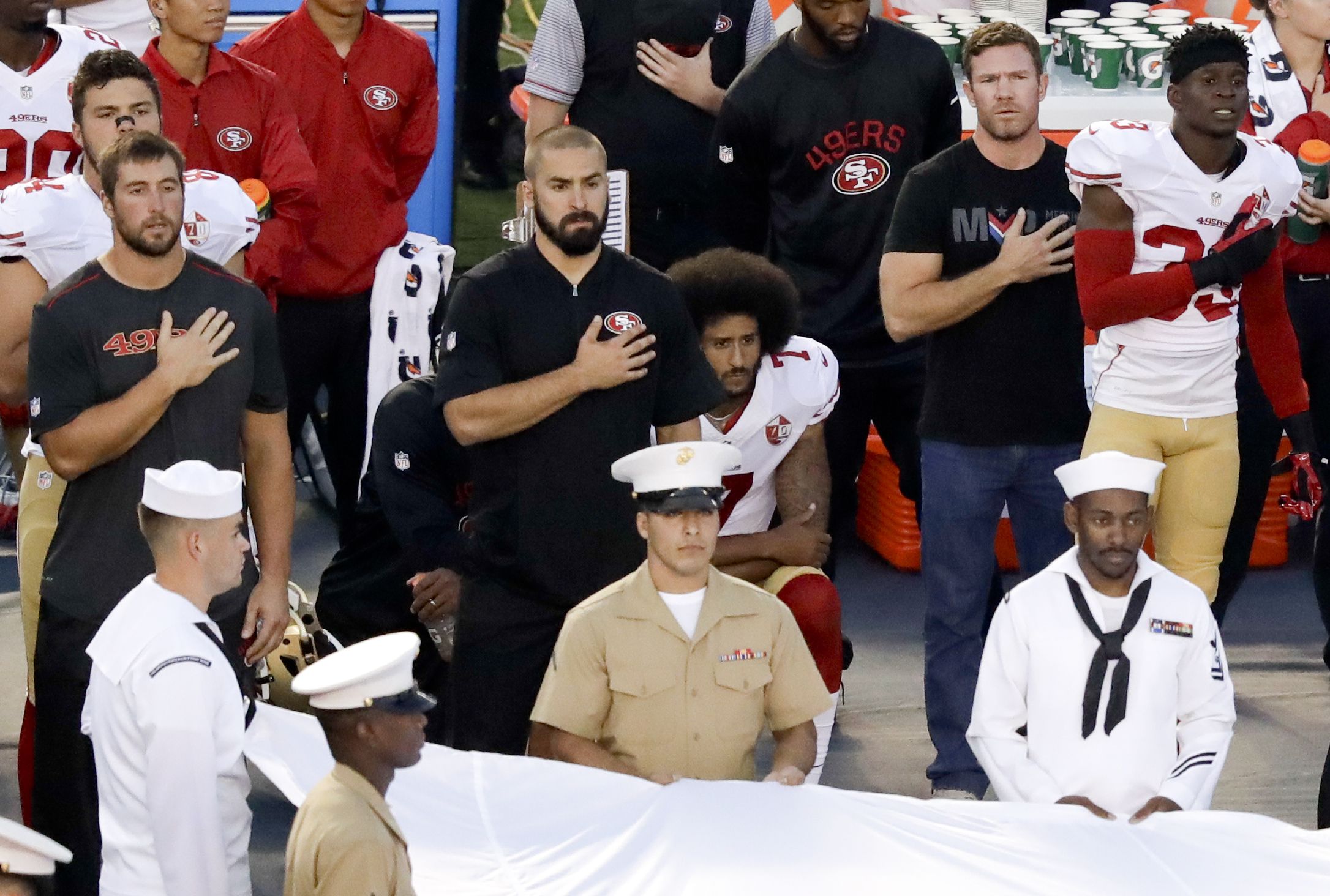
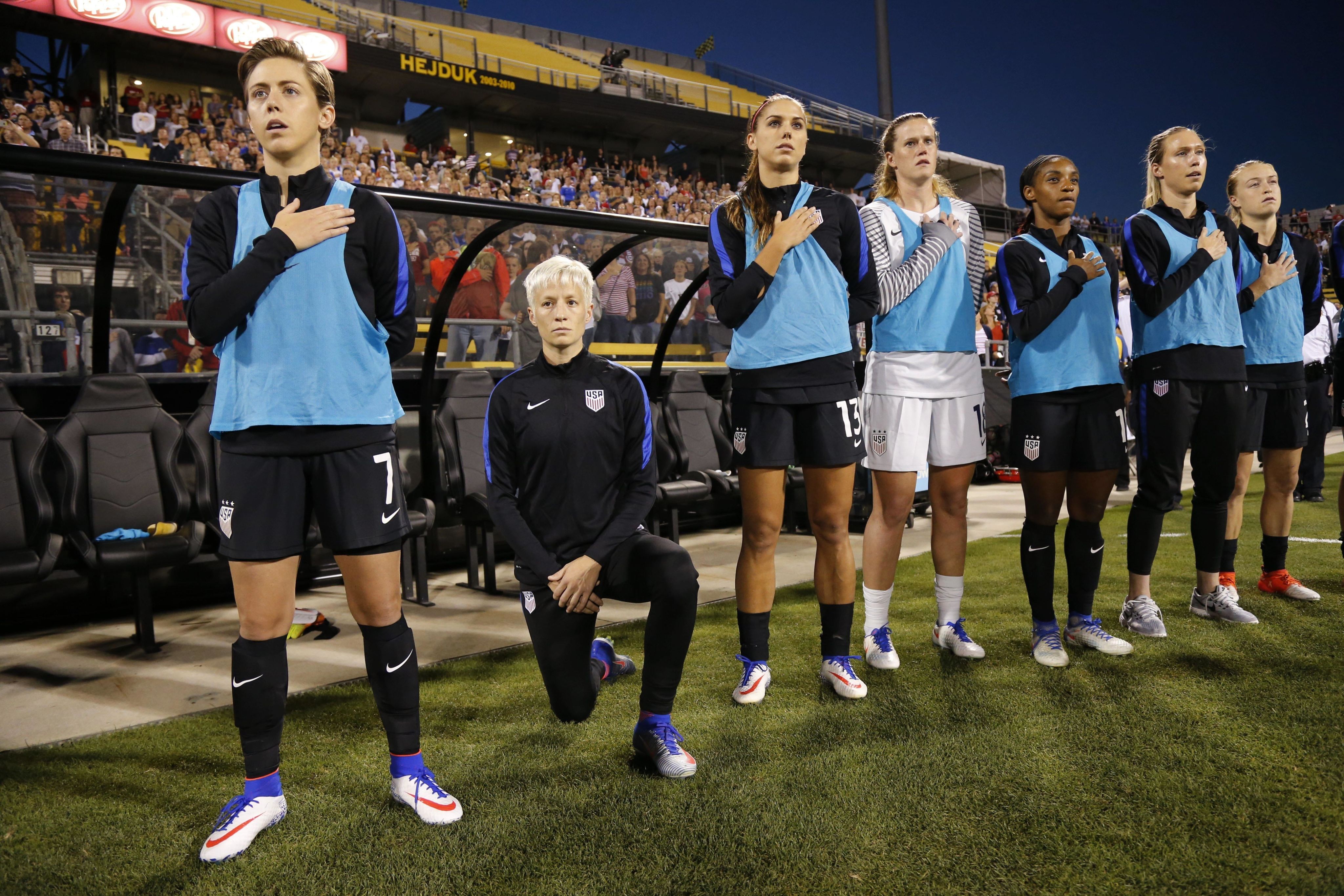
"There were death threats, threats of violence, and horrible language," she writes in her autobiography. "A guy identifying himself as a former fan said he was thinking of burning my shirt. I was called every name under the sun."
But she didn't back down, not even when frozen out from the national team by then coach Jill Ellis for having knelt as the anthem played before a friendly against Thailand in Columbus later that same September.
Five years on, the pre-match pause for footballers to take a knee before kick-off is familiar to fans worldwide. Harder asks Rapinoe how her understanding of the gesture and its interpretation by the wider public has evolved over time…
Pernille: You're an activist, and something I'm inspired by is that you're always leading the way - an example is the kneeling. I think you were the first white person to do that. Now we're all doing it, but you were brave enough to do it first. What was the process behind that?
Megan: You just do it! Honestly, it was very quick. But I was definitely naive to the depth of it because I've never experienced that, and that's a big part of the privilege of being a white person.
A few years previously, a young boy called Trayvon Martin had been killed in Florida. There was Michael Brown who was killed in 2014 in Ferguson, Missouri.
From that point on, it was very much part of the national dialogue. Activists and athletes were getting more vocal about it. It felt like a wave.
By September 2016 [when Colin Kaepernick first took a knee], I had already dove in a little bit. There's a lot of racism - we're America, our whole country is founded on slavery, it's obviously there.
What Colin's saying about police brutality, and the targeting of black people… I remember my feeling at the time being, 'this just makes sense'.
And he put this simple action into the conversation, that you could support in a physical way - not just tweeting or saying something. The national anthem was something that we all do before the games, it plays every single time.
I thought, 'I know that I believe what Colin is saying. I don't know all the answers but what he's saying is so clear, the way he articulates it.' It was easy to understand. I just supported him.
I felt at the time that I'd been in a position with marriage equality and gay rights, to ask for allies, to ask other people to believe what I'm saying, and to respect me as a full human being.
That's not to compare the two - I think racism is so much worse - but I felt I could understand what that position was like.
I knew I had some sort of platform. I didn't think it was going to be necessarily as big as it was. Maybe that was me being a little naive, but I still think to this day that it was an easy thing for me to do because I believed him.
I can see that we have these issues in our country and you don't have to have all the answers right away. I led with my heart and my mind, and that's what guided me there.
There was a lot of fallout from it. But even in the four short years after Colin was kneeling for the first time, look how far we've come - everyone who had something to say to Colin and the people who supported him have been proven wrong.
A lot of people are on board now, and that's not to say that they were wrong and I was right - it's not about that - it's just that sometimes history catches up quickly.
I think the more people that get involved and speak out on behalf of what's right, the quicker we can get to things instead of labouring through discrimination and racism.
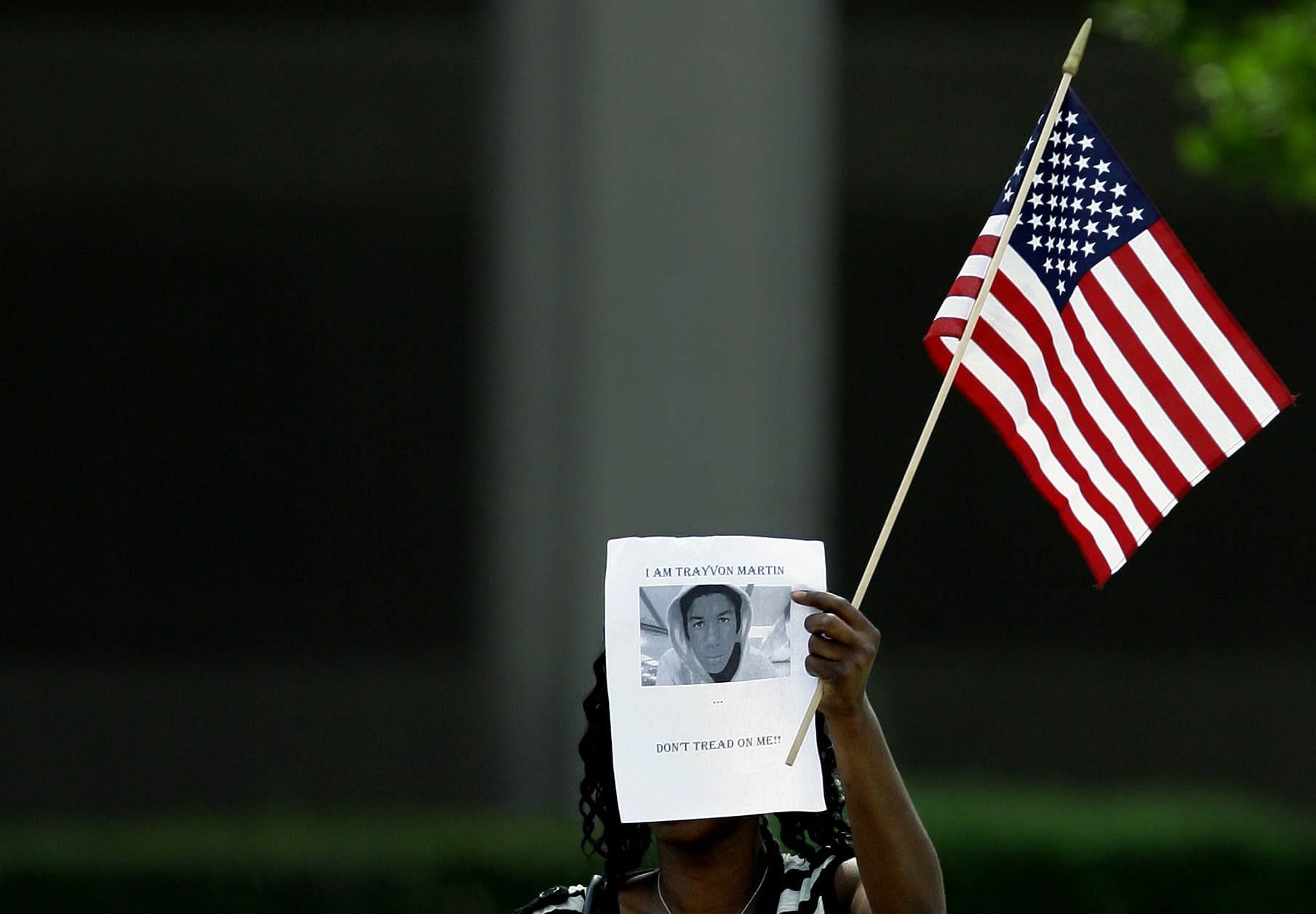
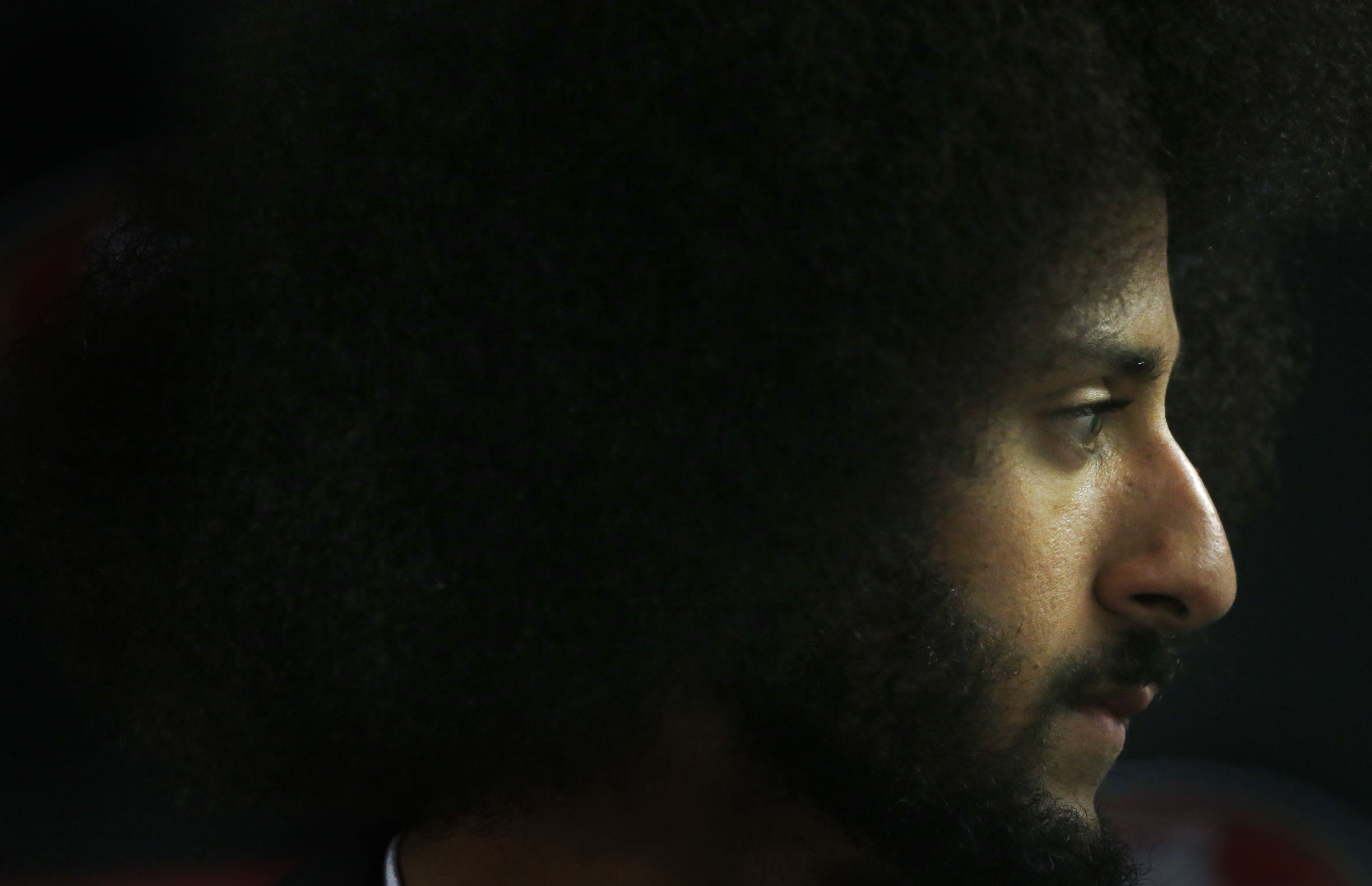
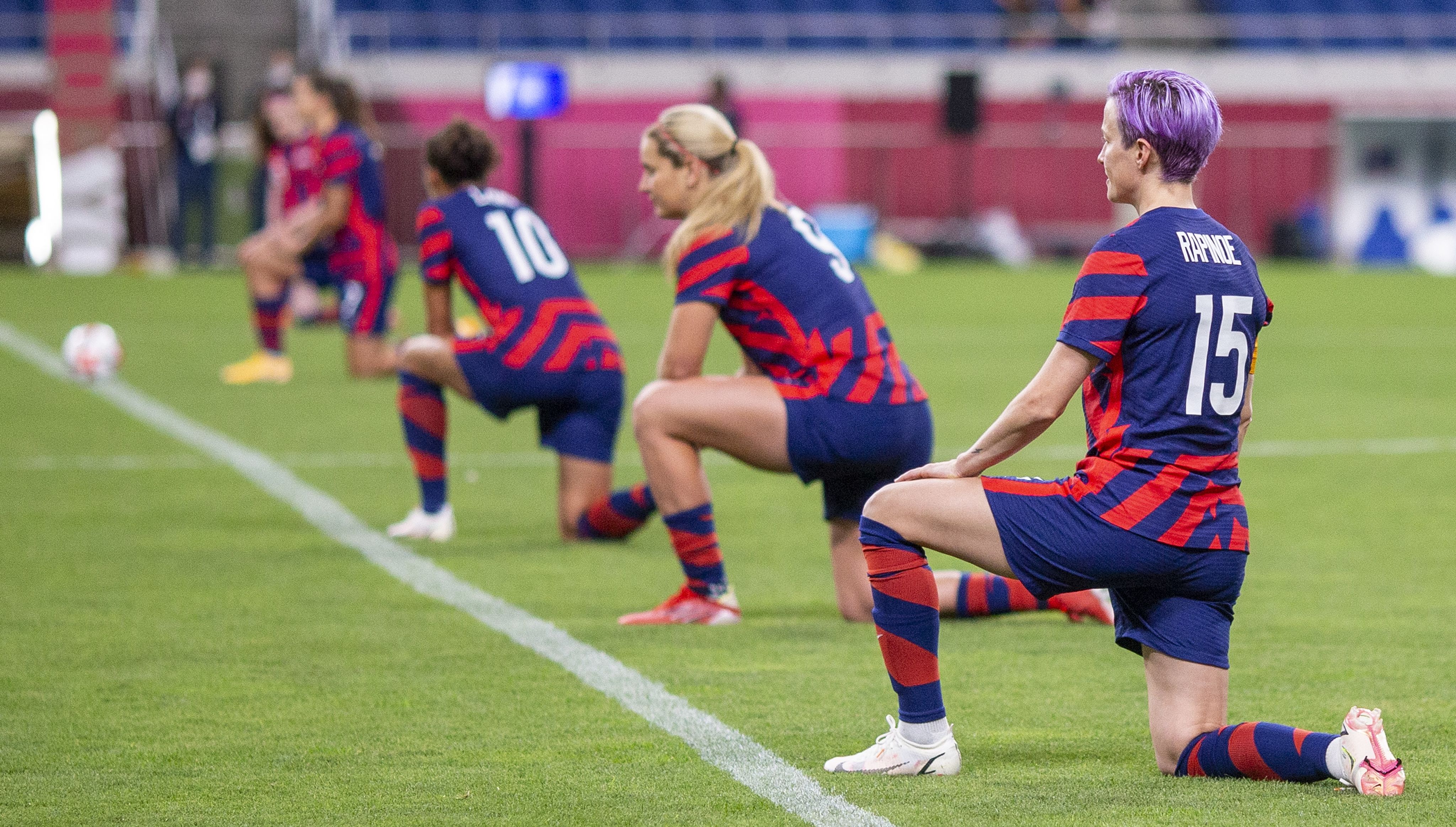
In Magda's view
Eriksson currently writes a column for the i newspaper in which she often raises issues relating to equality in football. When she began the series of articles in late 2020, she explained: "I have a lot to say and I feel like I want to get my voice out there."
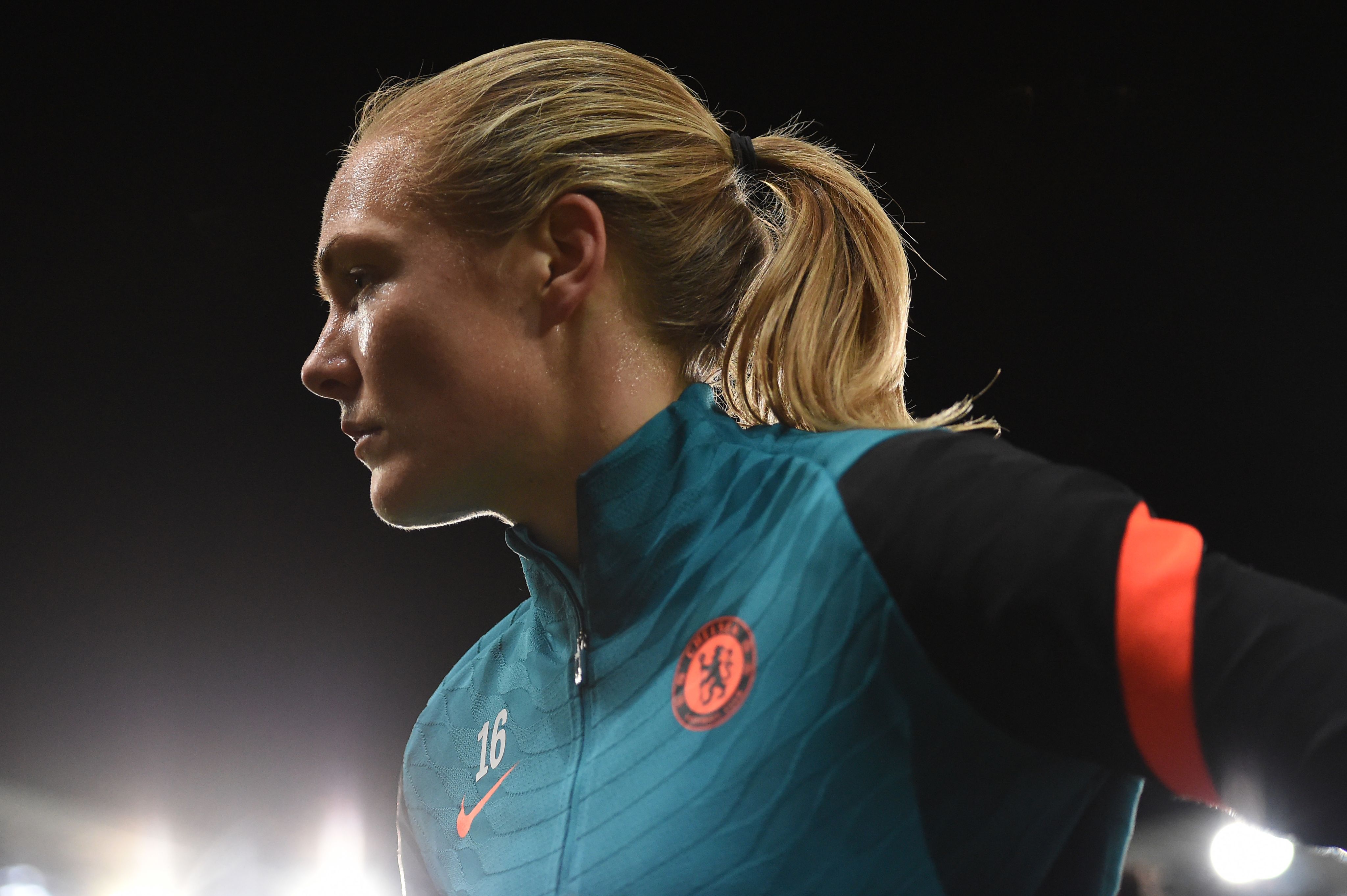
She has grown increasingly confident in communicating her opinions - her studies in political science helping her to craft her message - and in November, she addressed the topic of the forthcoming men's World Cup, her column headlined: 'As a gay woman, I'd never want to go to Qatar - footballers should speak out over human rights'.
She wrote of her unease with 'sportswashing' from countries where homosexuality is illegal and took aim at FIFA's lack of transparency, calling for the views of players and fans to be given greater consideration.
It created a stir, particularly back in her homeland, and she admits she was "naive" to the repercussions. "There was so much attention - I had media calling me every day, things were drawn out of context, and I was criticised. For a short moment, I thought, 'why did I do this?'
"But then I focused on the good comments, such as a text I got from my dad saying how proud he was of me making a stand." She was grateful for Harder's strong support too.
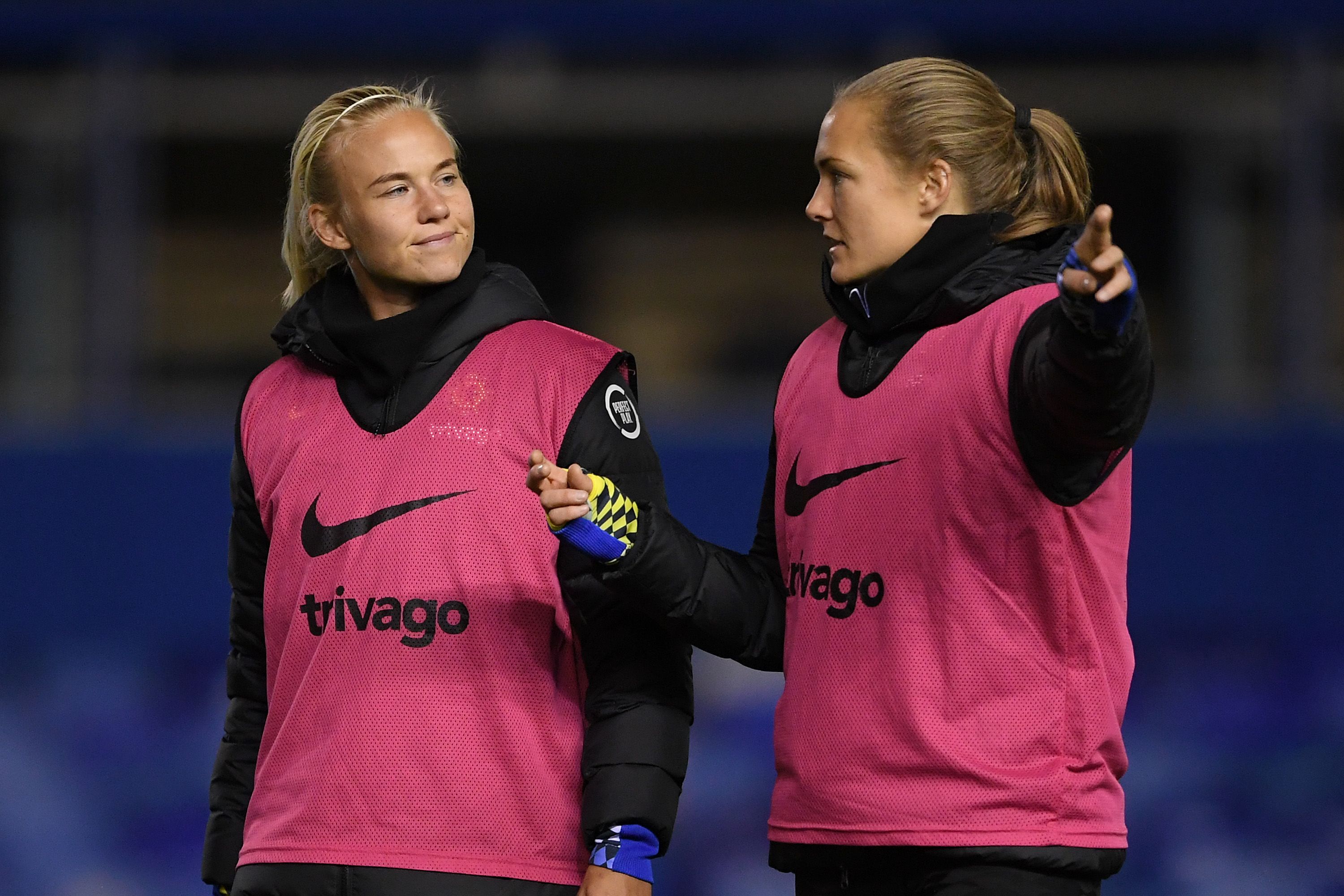
Previously she had written about online abuse and sexism, but the territory of taking a stance contrary to that of the game's governing body was new and challenging. Gianni Infantino was even quizzed about Eriksson's column on Qatar by a Swedish journalist.
She agrees that adopting the mindset used by Rapinoe when making a speech is the best possible preparation. "You have to focus on the ones you are reaching. You're not speaking to the men's team or the FIFA boss," she says.
Rapinoe tells Eriksson what she learned in the aftermath of kneeling for the first time. "The amount people were mad at that told me how important it was - what Colin was doing, and what I followed him in doing. I imagine you're having that same feeling.
"They're mad because I'm saying something they don't want people to hear. And I'm saying it in a way that looks different from Colin. People expect him to talk about racism like that, but they don't expect me to.
"I realised that's the game - the viral moment, the negativity, the comments, and the fake outrage. So many people were so upset, so immediately, that I knew that I'd hit the nail on the head. Now I'm drilling down into that, deeper.
"It's hard because you get a lot of hate. But the more hate you get, the more impact you're making."
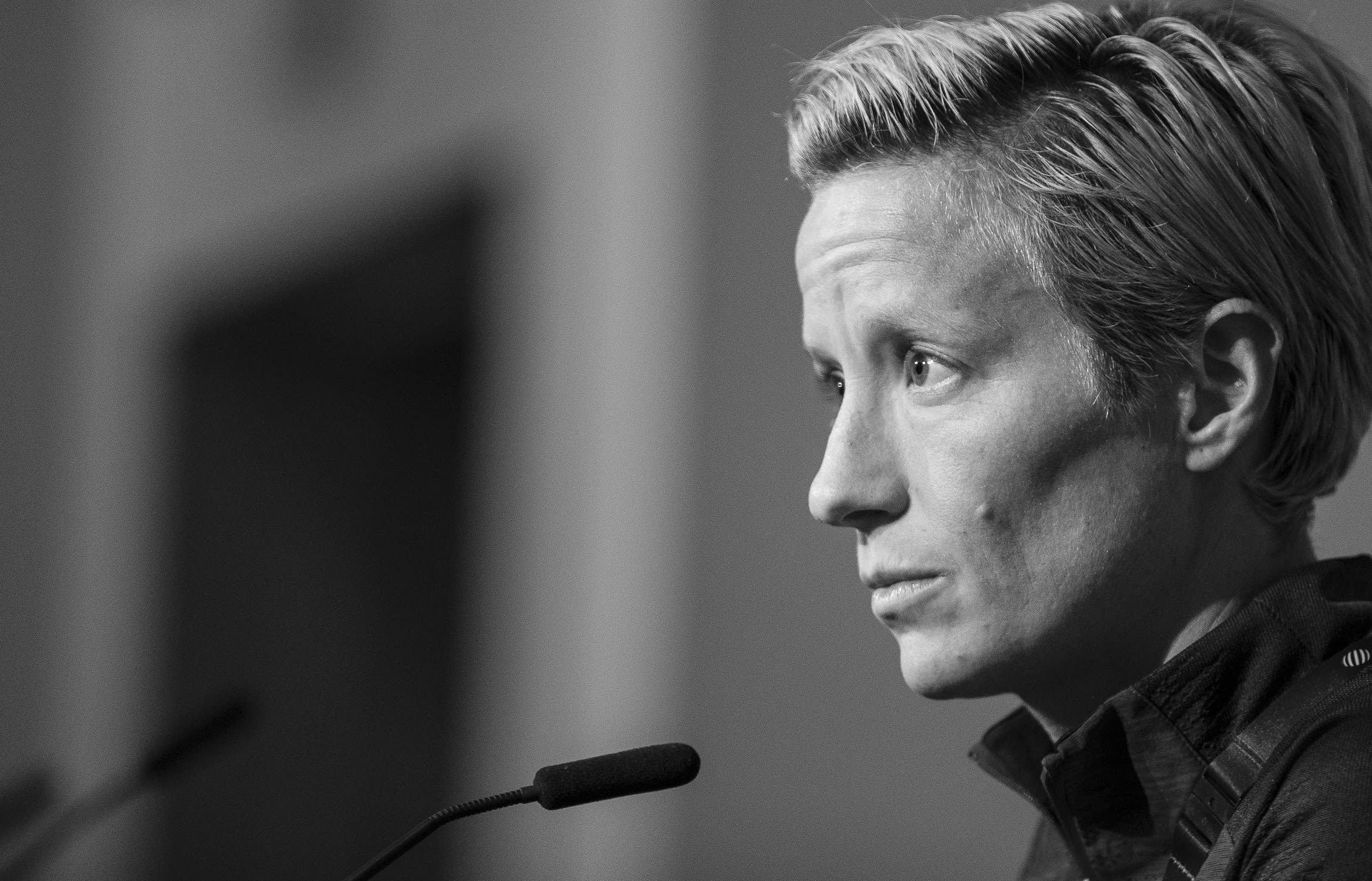
Eriksson's experience was one of scrutiny but this hasn't deterred her. In fact, she is even more determined to direct questions at football's decision-makers. "This was my first controversy. The next time, it'll get easier," she suggests to Rapinoe, who reassures her.
"Yeah, part of it is practice. When everyone wants to talk to you, you feel like you want to defend yourself, and explain - and then you get into the weeds.
"You took the time to write it, and it says what you wanted it to say. Let that speak for itself."
Allowing for authenticity
Both Harder and Eriksson have played against Rapinoe before in internationals but there have been few opportunities for them to build a closer bond as friends. As their conversation draws to a close, they return to their shared experiences as out gay athletes and their collective desire to see more inclusive education delivered through sport.
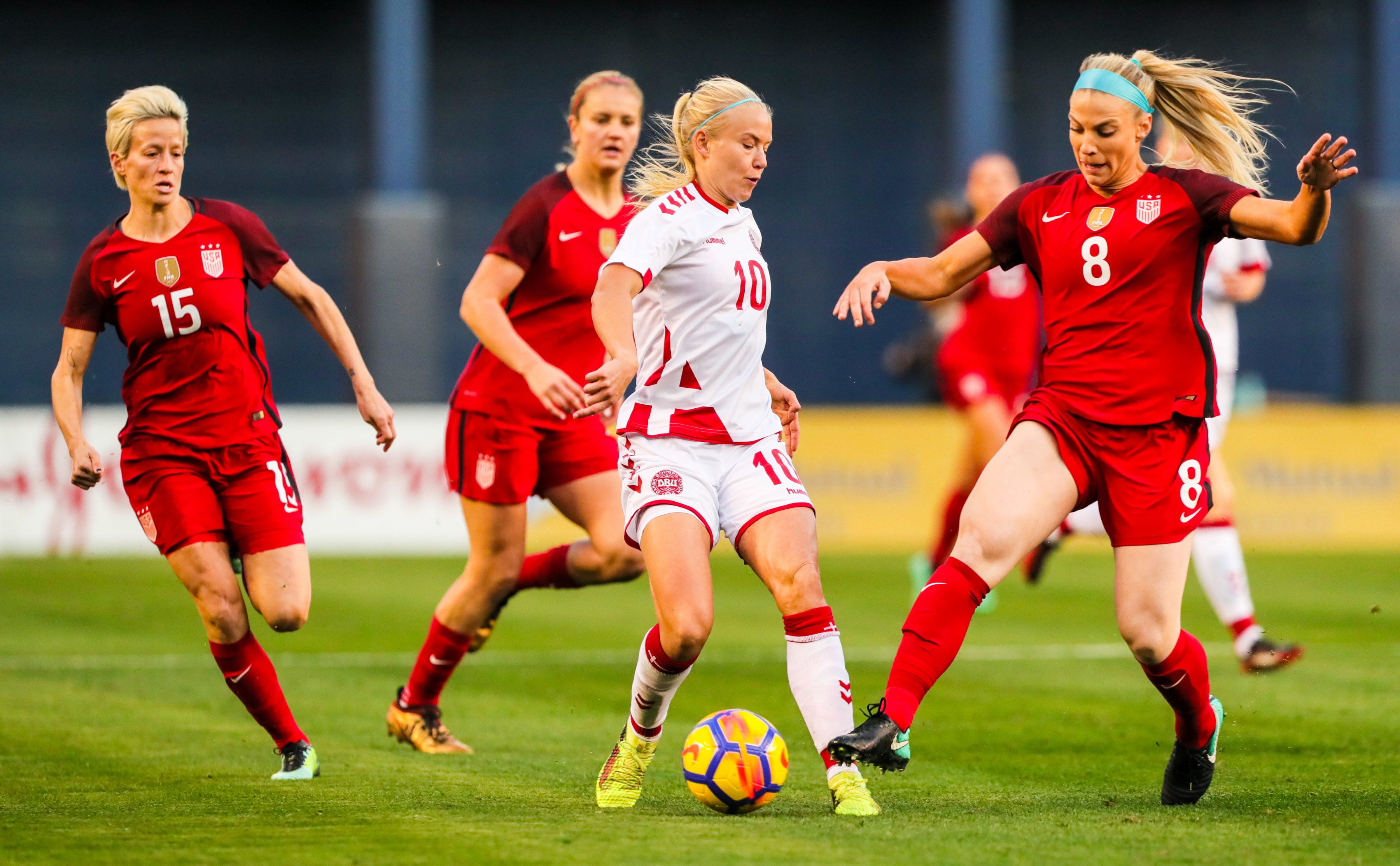
Rapinoe and Harder in action in a USA vs Denmark friendly in San Diego in January 2018 (Photo by Kent Horner/Getty Images)
Rapinoe and Harder in action in a USA vs Denmark friendly in San Diego in January 2018 (Photo by Kent Horner/Getty Images)
Harder asks Rapinoe if she has advice for those struggling with their sexuality, but her response is first directed towards those who aren't LGBTQ+.
"To everyone in the sporting culture, you have a responsibility to think about what you're saying and ensure that you're creating an environment that's welcoming and open," she says.
"We get asked all the time - why aren't there more out male athletes in elite sport? It's because they don't feel safe. They feel like they're going to get abuse from fans, they're going to be kicked off teams, have slurs thrown at them, whatever it is.
"It's safer on the women's side - we have a lot of camaraderie between ourselves and people coming out, which makes it easier for everyone. But I would say from sporting directors to club owners, to fans and players, it's your responsibility also."
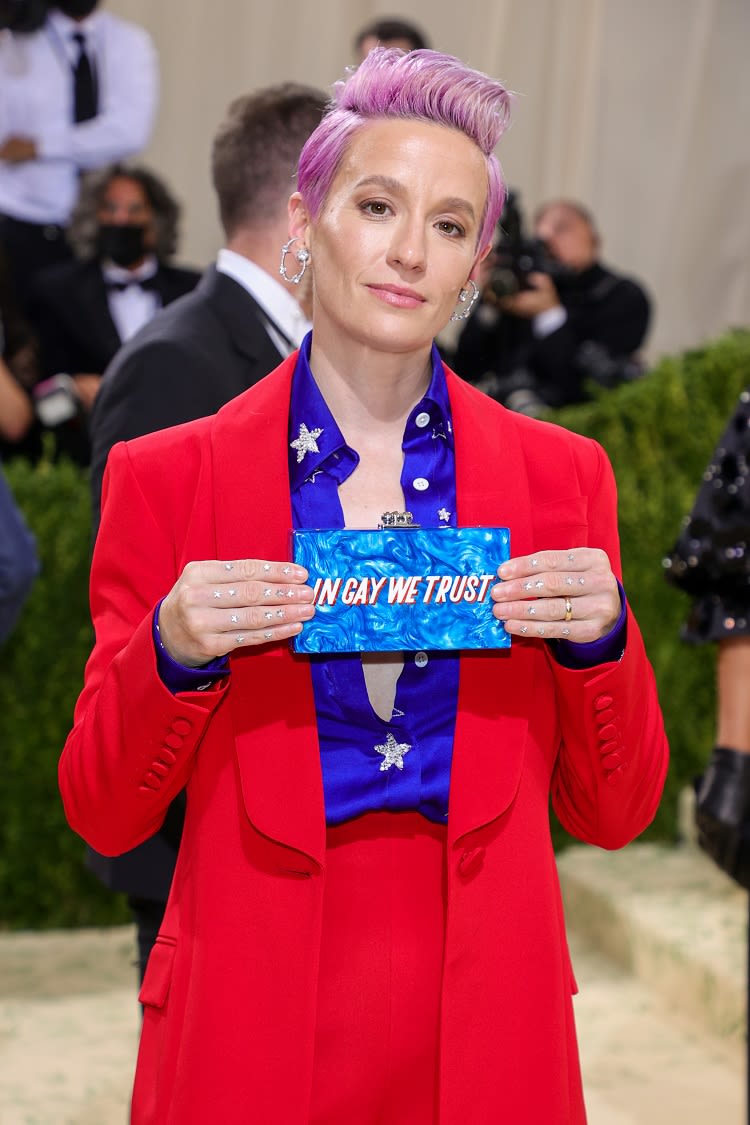
Rapinoe at the Met Gala in New York City in September 2021 (Photo by Theo Wargo/Getty Images)
Rapinoe at the Met Gala in New York City in September 2021 (Photo by Theo Wargo/Getty Images)
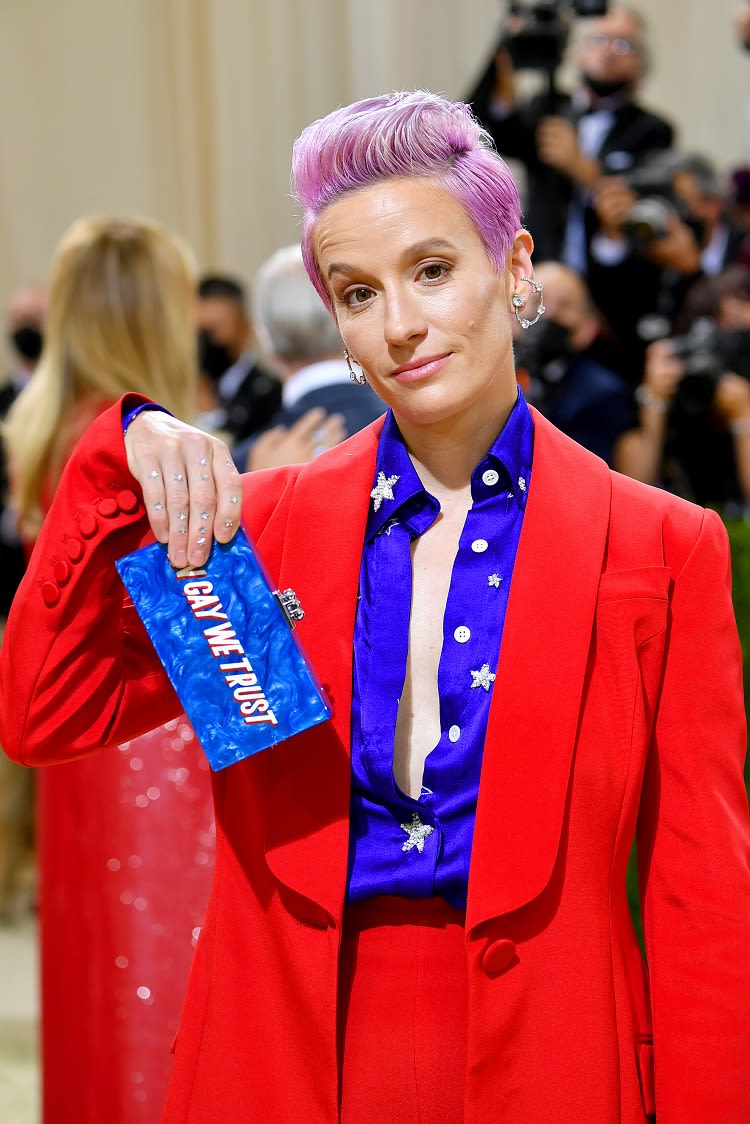
Rapinoe at the Met Gala in New York City in September 2021 (Photo by Jeff Kravitz/FilmMagic)
Rapinoe at the Met Gala in New York City in September 2021 (Photo by Jeff Kravitz/FilmMagic)
Meanwhile, for an individual who is lesbian, gay, bi or trans and who is trying to find their place in the world, it's about locating those who can help to lift the burden so that being LGBTQ+ is a part of yourself that you wear comfortably.
"Whether it's online, at school, or with friends, it's really important to be able to talk to people. Often, it can feel like you're the only one going through what you're going through.
"Through talking, you not only get this sense that you're not alone, but also that you are who you're supposed to be. Having people that don't just accept you but who celebrate you.
"We all have parts of ourselves - sexuality aside - that are just different, that are quirks, such as the type of music we like, or your hobbies, the way you dress, your kind of humour.
"We all have these little things that when we allow ourselves to be full people, become beautiful and that we can appreciate about other people.
"So, it's about finding that community that can really support you, love you, and provides that safe space.
"Then we can all just enjoy life, be happy and healthy, and be who we are."
Eriksson leans back, smiling. "That's a very good answer!" Harder is also beaming. "The future's bright," she says. The attentive students are ready to let Rapinoe return to her post-training wind-down.
It's late in London when the call ends but the Chelsea players are excited for what's next - they have the platform, the pride, and the passion to keep pushing forwards.
The HangOut with Pernille and Magda, featuring Megan Rapinoe, is a collaboration between Sky Sports and Ten Toes Media


